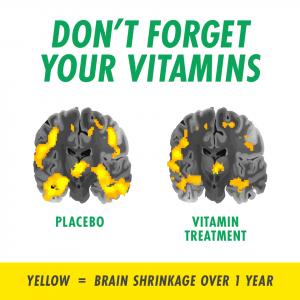Published on October 21, 2022
Learn more about the latest, important discoveries with the brain and how to protect it from dementia, Alzheimer’s Disease, and other cognitive disorders
Key Points
- 99% of Alzheimer’s is not caused by genes but is the direct result of diet and lifestyle factors – and is predictable from as early as age 35
- Brain cell membranes consist of phospholipids, which are connected to omega-3 fatty acids (specifically DHA) through a process of methylation, which is dependent on B vitamins; lacking these nutrients can lead to increased homocysteine levels, a measurement which can predict the rate of brain shrinkage as we age
- Lowering homocysteine levels with B vitamins can cut brain shrinkage ONLY in those with enough omega-3s
 How does your brain work? How can it work better? Why does brain function decline in so many individuals, and how can you make sure you’re not one of them?
How does your brain work? How can it work better? Why does brain function decline in so many individuals, and how can you make sure you’re not one of them?
GrassrootsHealth is supporting the Alzheimer’s is Preventable campaign, with our partners Food for the Brain Foundation, who kick off their campaign on November 1st with an unprecedented group of world experts on Alzheimer’s, giving an online 3 hour masterclass to show how 99% of Alzheimer’s is not caused by genes but is the direct result of diet and lifestyle factors – and is predictable from as early as age 35.
“It is largely a preventable disease and we know quite a lot about what people need to do to help prevent it,” says Professor David Smith from the University of Oxford, whose research has shown up to 73% less brain shrinkage, and no further memory loss, giving B vitamins. He is one of eight experts talking at the masterclass – see foodforthebrain.org/aipmasterclass.
How is This Possible?
The following video, Build Brain Cells (at Any Age) describes how certain vitamins and nutrients (specifically B vitamins and omega-3 fatty acids) contribute to brain health – and how a brain relies on getting enough of these nutrients.
Build Brain Cells from Food for the Brain on Vimeo.
In Summary…
- There are over 100 billion brain cells (neurons) in our brains, with over 100 trillion connections between them
- Neurons communicate through neurotransmitters, which are chemicals that rely on certain vitamins and nutrients
- Brain cell membranes consist of phospholipids, which are connected to omega-3 fatty acids (specifically DHA) through a process of methylation, which is dependent on B vitamins
- Lacking these nutrients can lead to increased homocysteine levels, a measurement which can predict the rate of brain shrinkage as we age
- Lowering homocysteine levels with B vitamins can cut brain shrinkage ONLY in those with enough omega-3s (measured by the Omega-3 Index)
- You can dementia-proof your diet and lifestyle – food for the brain can show you how… one step at a time
The charity foodforthebrain.org has a free, validated online Cognitive Function Test, followed by a Dementia Risk Index questionnaire, which not only measures your cognitive function, but also shows you exactly what your risk is and how to reduce it by targeting your ‘weakest links’ using eight known prevention steps.
Take the Food for the Brain Quiz
Event Registration Closes this Thursday, October 27th
Is Alzheimer’s preventable? Registration for the event on November 1st closes this Thursday, October 27th – register your place now at https://foodforthebrain.org/aipmasterclass for £20 (approx. $20), with 4 CPD points.
Other experts speaking include:
- Professor Robert Lustig, University of California
“Sugar levels at age 35 predict Alzheimer’s risk later in life” - Professor Jin Tai Yu, Fudan University, Shanghai
“His meta-anaylsis of 396 studies shows what’s driving dementia.” - Dr Tommy Wood, Ass.Professor, Washington University,
“For many people the worst thing for their brain is to retire” - Dr David Vazour, East Anglia University
‘The superhighway of the gut-microbiota-brain axis, is one of the hottest fields of research.” - Dr Simon Dyall, lead for clinical neuroscience and nutrition at the University of Roehampton
“DHA supplementation appears to show the greatest promise.” - Neurologist and New York Times best-seller Dr David Perlmutter brings together the 8 secrets to upgrade your brain.
“Two thirds of dementia risk could be cut starting early, experts believe.”
Test Your Vitamin D and Omega-3 Levels at Home to Make Sure Your Levels Are Supportive of Cognitive Health
 Having and maintaining healthy vitamin D and other nutrient levels can help improve your health now and for your future. Choose which to measure, such as your vitamin D, omega-3s, and essential minerals including magnesium and zinc, by creating your custom home test kit today. Add hs-CRP to measure your level of inflammation as well. Take steps to improve the status of each of these measurements to benefit your overall health. You can also track your own intakes, symptoms and results to see what works best for YOU.
Having and maintaining healthy vitamin D and other nutrient levels can help improve your health now and for your future. Choose which to measure, such as your vitamin D, omega-3s, and essential minerals including magnesium and zinc, by creating your custom home test kit today. Add hs-CRP to measure your level of inflammation as well. Take steps to improve the status of each of these measurements to benefit your overall health. You can also track your own intakes, symptoms and results to see what works best for YOU.
Enroll and test your levels today, learn what steps to take to improve your status of vitamin D (see below) and other nutrients and blood markers, and take action! By enrolling in the GrassrootsHealth projects, you are not only contributing valuable information to everyone, you are also gaining knowledge about how you could improve your own health through measuring and tracking your nutrient status, and educating yourself on how to improve it.





